As the United States and all industrialized states have grown over the centuries, this tax burden as grown and grown. If you for some reason you think that you're free from the financial serfdom that is the modern industrial tax base, you're wrong. My personal tax freedom day doesn't come until May 10th, and I live in a "low tax state". I think part of the reason more people don't get pissed about this is because they don't know what their paycheck means. So here's a quick run down.
Withholding taxes: these are the taxes that you're expected to pay the federal govt. If you over pay these during the year you will get a refund when you file your taxes next year. If this is happening it's a bad thing because you're giving the govt an interest free loan. They love people like you!
Social Security and Medicare taxes (FICA or OASDI): Federal social insurance taxes are imposed on employers and employees, ordinarily consisting of a tax of 6.2% of wages up to an annual wage maximum ($117,000 in 2014) for Social Security and a tax of 1.45% of all wages for Medicare. Many people don't realize it, but the employer matches the employees contribution. So instead of the 6.2% that is paid in, it's actually 12.4% since the company never retires and receives payment.
Unemployment Taxes: Employers are subject to unemployment taxes by the federal and all state governments. The tax is a percentage of taxable wages with a cap. The tax rate and cap vary by jurisdiction and by employer's industry and experience rating. For 2009, the typical maximum tax per employee was under $1,000. Some states also impose unemployment, disability insurance, or similar taxes on employees.
The Federal govt figured out a long time ago that they needed to take all of this out of people's paychecks prior to April 15th because otherwise they wouldn't have the money to pay the taxes.

 RSS Feed
RSS Feed
